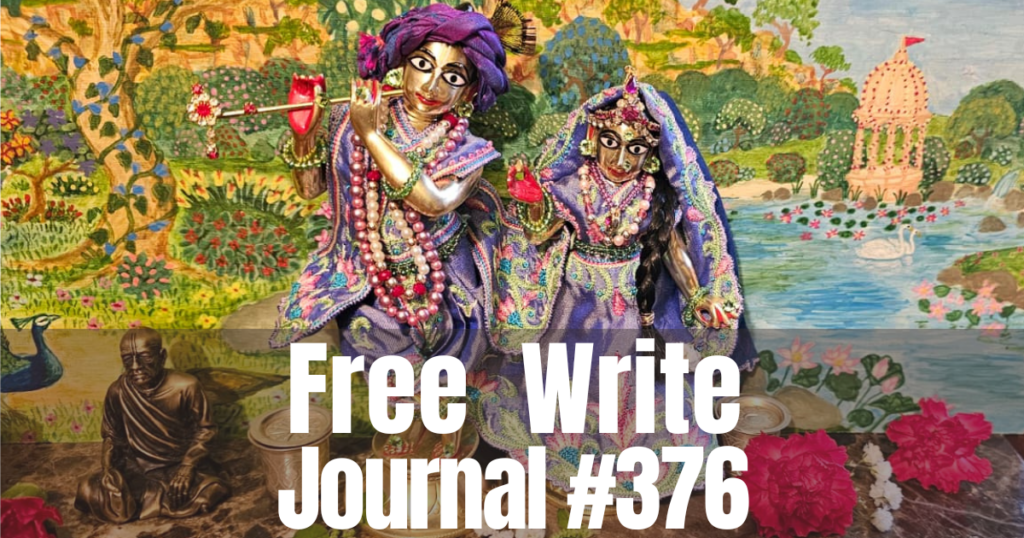
Vyasa Puja Birthday Celebration of H.H. Satsvarupa dasa Goswami
The Veterans of Foreign Wars Hall, 845 Hudson Avenue, Stuyvesant Falls, New York 12173
There is plenty of parking near the Hall. The facility is just a few minutes’ walk from SDG’s home at 909 Albany Ave.
10:00 – 10:30 A.M. Kirtana
10:30 – 11:15 A.M. Presentation by Satsvarupa Maharaja
11:15 – 12:30 P.M. Book Table
12:30 – 1:15 P.M. Arati and kirtana
1:15 — 2:15 P.M. Prasadam Feast
Baladeva Vidyabhusana at [email protected] or (518) 754-1108
Krsna dasi at [email protected] or (518) 822-7636
Madana Gopal at [email protected](973) 876-4508
“I request as many devotees as possible to attend so we can feel the family spirit strongly. I become very satisfied when we are all gathered together.”
******
“In the association of pure devotees, discussion of the pastimes and activities of the Supreme Personality of Godhead is very pleasing and satisfying to the ear and the heart. By cultivating such knowledge one gradually becomes advanced on the path of liberation, and thereafter he is freed, and his attraction becomes fixed. Then real devotion and devotional service begin.”
“The process of advancing in Kṛṣṇa consciousness and devotional service is described here. The first point is that one must seek the association of persons who are Kṛṣṇa conscious and who engage in devotional service. Without such association one cannot make advancement. Simply by theoretical knowledge or study one cannot make any appreciable advancement. One must give up the association of materialistic persons and seek the association of devotees because without the association of devotees one cannot understand the activities of the Lord….. One who has firm faith in the Supreme Personality of Godhead becomes fixed, and his attraction for association with the Lord and the devotees increases. Association with devotees means association with the Lord. The devotee who makes this association develops the consciousness for rendering service to the Lord, and then, being situated in the transcendental position of devotional service, he gradually becomes perfect.”
— Srimad-Bhagavatam 3.25.25, verse and purport
Hari Hari,
Ultimately Satsvarupa Maharaja did not go through with the podcast with Namarasa and Vyenkatta Bhatta. He just plain ran out of steam, much to the disappointment of the interviewers. At least they had lunch with him and got some of their favorite books signed. I was duly criticized for “allowing” the drama to go on for so long, seemingly at the expense of his health. The unseen part of the equation is realizing how determined Satsvarupa Maharaja was to share “his Prabhupada” with us despite the risks. Hopefully we will get better at compromising in the future so that the care team and Satsvarupa Maharaja are playing it safe but still satisfied.
All in all, Satsvarupa Maharaja has done his duty with decades of focus on writing for devotees. GN Press is on an estimated two-year marathon to finally get all his books in print. So far the number of his books listed on Amazon is 146 and climbing monthly. By crafting many different genres, there is literally something for everyone. Satsvarupa Maharaja appears tired but settled after hosting his friend Jayadvaita Swami for a few days.
your servant,
Baladeva
We need to expand our team of proofreaders as we aim to increase the rate of republication of Satsvarūpa Mahārāja’s books as well as new books that he writes.
This includes a need for fluent bilingual Spanish and English speakers to proofread Spanish translations (we currently have around 20 Spanish translations waiting to be proofread).
Anyone interested in this particular service should contact Manohara dāsa at [email protected]
If you would like to help, please contact Kṛṣṇa-bhajana dāsa at [email protected] or [email protected] and we will find you a service that utilizes your talents.
Krsna, I’m serving You by reading, by writing, by being alone culturing some kind of peace in Krsna consciousness, avoiding management, headaches. I can’t take it, I say. Still, I ask You, what do You want me to do? You know I can’t do anything and everything.
******
5:02 P.M. I just finished sixty-four rounds and the last round took only six minutes and twenty-nine seconds. So there’s nothing much to say except Hare Krsna Hare Krsna, Krsna Krsna Hare Hare.
******
You walk to your room and out of your room and then into the bathroom and out of the bathroom and into the porch and out of the porch and into the living room and out of the living room . . . wherever you go, devotees are chanting there: Hare Krsna Hare Krsna, Krsna Krsna Hare Hare. We’re all grinding our molars, grinding our mantras, coming to the top of the quota.
******
What do you get out of it? Did you reach the devotion? Did you pray to your Lord? Did you allow your cynic full force? Chant, chant, chant, chant, chant, chant mechanical? …. I did it, I did it, like a little gurukula boy. I feel the urge to run up to each adult and say, “I did it, I did it, I chanted my quota.” Is that what it’s all about?
******
Dear Lord, I’m just a blank, but You see me chanting and so there’s some good in it, I know, and I feel it too, but it’s way subterranean from where we have taste, and that’s because I cause offenses. That’s what Lord Caitanya says.
******
In less than an hour we meet for our little group
session. I don’t want to be so casual and just say,
“Oh, I just grinded away
sixty-four rounds today,
and I didn’t feel anything,
but I chanted quicker than
yesterday.” Really, can’t
you say something? Where’s
your heart? I don’t know, I
don’t know. There’s nothing to say,
really, except that I’m here,
I’m chanting,
and I don’t feel so
great but I don’t
know what else to do.
I did the vrata and I’m glad
for that. I feel good about it,
but I don’t have anything
to say. I’ll just improvise:
Just chant Hare Krsna, Prabhus.
******
I seem to be experienced in that I know my offenses form a mountain and I can’t crack it. In the back of my mind, I know I wouldn’t mind getting symptoms of ecstasy. But I am experienced with the sastra’s statement that lack of taste is caused by offenses. And so I must be counting them, and even sixty-four rounds a day, if one’s chanting is infested with the ten offenses, then despite one’s endeavor to chant for many lifetimes, he will not get the result . . . krsna-prema.
******
My adventure is simply the climb up the rungs of the numbers, ten, twelve, twenty-four, thirty-six, up and up. I was able to do it, surmount the impossible-seeming climb of sixty-four rounds two days in a row. By my own endeavors, so called. I will do it today and sincerely hope the headache doesn’t come to prevent me.
******
It’s mostly sitting down or sometimes pacing in this house . . . you watch what round you are on, time yourself with stopwatch. Sometimes you can’t go faster than 8.40. But then you find you can go very fast, especially when you whisper and some are even under seven minutes.
pp. 108-111
You should become a devotee of Krishna. Why?
Bhagavad-gita describes four kinds of persons who do not become devotees of Krishna. One is the mudha, or fool. Just as a donkey works hard all day simply to get some grass from its master, the foolish materialist takes up the burden of hard work just to maintain himself and his family, but he neglects spiritual life. Such a poor mudha, wrongly thinking he is his body, identifies himself as an American, a Russian, an Indian, and so on. And his only ken of happiness is in terms of his body.
Bhagavad-gita also describes the naradhama, “the lowest of men.” Although educated and cultured, the naradhama has no spiritual sense and is thus unable to take up devotional service.
Another kind of person unable to serve Krishna is the mayayapahrta-jnana, one whose sophistication in philosophy or religion leads him to think that religion is a relative, cultural phenomenon, that Krishna is a myth, or that God can be found only in a particular religious sect. According to Vedic knowledge, however, one can know a true devotee of God not by whether he is nominally a Christian, Jew, Hindu, or whatever but by whether he has developed the symptoms of love for God. The chief of these are complete absence of mundane desires and an unimpeded flow of devotional service to God.
Bhagavad-gita describes a fourth category of persons who don’t become devotees: asuram bhavam asritah, the staunch atheists. Obviously, the avowed atheist will not become a devotee of God.
So, the reasons you should become a devotee of Krishna are compelling, whereas the reasons you don’t are descriptions of misfortune. If you can admit that there is substantial validity to our claims for taking up devotional service, you should investigate further. Even if you are not prepared to change your life totally, you can add devotional service to it without any difficulty. Association with the great souls of the past is available through Srila Prabhupada’s translations of Bhagavad-gita, Srimad-Bhagavatam, and other books of Vedic literature. And the current followers of Lord Krishna, the members of the International Society for Krishna Consciousness, are eager to share this knowledge and introduce you to such practices as chanting Hare Krishna and offering food to Krishna, which you can easily adopt. Why don’t you become a devotee of Krishna?
—Back to Godhead, 16(8) (August 1981): NOTES FROM THE EDITOR
pp. 71-76
Did a dream send you a grand concept of a metaphor you could fit everything into? An inkling of it or a piece of it? No. But I did discuss it last night with my friend. He said for himself an all-encompassing theme has been that of identity. He used to be very much absorbed in being a football fan. Then he became an Irish Republican. Then he was a punk singer. He was a father and husband, a truck driver. These things didn’t all fit neatly together but seemed contradictory. He saw other people accepting identities and saw that they were play-acting. He didn’t want to do that. But he couldn’t find for sure who he was. I remember this especially from the 1960s. It was a popular way of expressing yourself. We spoke of someone having an “identity crisis.” More mature or cynical people would make fun of idealists who are still asking themselves, “Who am I?” Young intellectuals would ride the subways or sit in espresso cafes and ask, “Who am I? What is the universe, and where are we going? What will happen after death?” Others made fun of this and they quickly supplied empirical answers to these metaphysical questions and made a joke out of it. “Who are you? You are Joe Jones, and you are going from the science building to the cafeteria, and you are hungry.”
My friend said, “Of course, just because identity is important to you doesn’t mean that you can take it up as a metaphor for your life in writing.” Then I told him about my resistance to writing fiction—because it’s a lie. He countered this and said, “How do you know that your truth of nonfiction writing, just whatever you feel—how do you know that this is more true? Say you write, ‘Nature is beautiful.’ Well, is that true? Nature is actually cruel. So you have to examine this question and not dismiss fiction as a lie any more that non-fiction.”
I then admitted the real reason I didn’t write fiction is because “I can’t get into it.” Why is that? Maybe it’s too hard to write. At least I feel that there’s more realness when you write immediately from your every-day moment-to-moment identity and experience. That may not be the Truth, but at least it’s not deliberately a construction of a character from your imagination. You don’t play God, you don’t make up life-plots. You just write what is going on and what you feel.
I paused and told my friend, “Improvisation is very important for me.” He laughed and said, “You should have been a jazz musician.” I was a little put off by his light tone on that. Improvisation, even jazz, seems a serious thing. Maybe I’m just more serious about it because the whole thing is weighing on me. It’s not just something that I talk about for a few minutes. Jazz is just an example I give because everyone knows it means improvisation. The real thing is not jazz music, but the act of writing in the way that you don’t prepare. You write what comes. It is somewhat out of your control. If jazz music is like that, then fine. But this is another kind of music, silent, on the page, the life of words or maybe imagination as it comes out.
And all these—metaphor, identity, improvisation—they all have to do with the creative process. Essentially, I write about writing. That’s my main topic. So why not make a metaphor out of it and make it your own kind of story? Well, no. We have to go a step further. What is even more important than creative writing?
Even more important than my evolution as an artist-preacher is my need to practice Krsna consciousness, to obey guru and the Lord and satisfy them. There are direct methods for this and you must ask yourself if your writing is accomplishing this. Is it Krsna conscious? Is it pleasing to guru and Krsna?
Return to the quest for direct Krsna consciousness. That means you simply tell what you are reading. You are like a man who speaks to his children after reading and putting down the newspaper. They could read it themselves, but maybe they don’t have the time. They appreciate his little insights when he says it in a simple way. They trust him. Information theory means what was lost in transmission. Say it is a radio. So they want to know what got lost because of static. But the theorists don’t discuss what is the actual information. Sadaputa, our brilliant Krsna conscious scientist, was discussing this, and I regurgitate it here. He said in Krsna consciousness, we say that information comes from the Supreme Personality of Godhead. That is a consistent and satisfying way to explain it. To get information, you also have to hear from a person. In that case, the Absolute Truth comes from a person in disciplic succession. His qualification is that he is truthful. He doesn’t change the original message. Also, your qualification in hearing is to receive it with trust. If you don’t trust him, then even if he speaks the truth, you cannot take it.
pp. 11-17
Messages to the Guru for a Week:
“Thank you for blessing our home.”
“I need you.”
“You are my eternal guru.”
No mice in sight, but various creaking sounds in this trailer home, perched like a matchbox on the side of a macadam – covered country road (covered so that the dairy farmers have smooth access to transport their products).
Tortured products.
Assimilated saint.
The creaking is the heating system turning on. Yes, I need heat.
Where’s my guru in my life? I’ll get back to him, but I feel a little too busy to think about it right now. Can’t do all the work I have. At this rate, this volume is gonna simply skim the top of busy weeks. M. suggested we could go back to Ireland early if I want. Go back and face the blank? Soul-making.
Tonight there’ll be fun
no doubt and someone
will fall
in love
’cause that’s what they do
tonight.
But me? Let it rain.
Creak, house, while
I walk in the galoshes
of my mind
a rubber band a
curling worm
in my intestine
and yours
Hernia—
Madhu’s—and
tonight Padgett
and I will play
ball.
Krsna in Vrndavana I said
for me is here in
Port Royal
not
Pearl
Street
Mott Street
Staten Island
where our car
passed through
last night.
Christmas night is over
the presents are
wrapped
tonight is about love of God
His son is
born
in a manger.
We want permission to
go back to Godhead
but joke and
go to Radha-kunda
on Christmas
Eve
green scum on
surface, turtles,
us afraid
but turning to the Source
for comfort.
Please, Christ,
please let me
call Your father’s name
with a drop of
your sincerity.
Talked to a few devotees about surrender to the Word of God. Kierkegaard said that scripture is like a love letter from the Beloved, and only a surrendered devotee can learn how to decipher it. After that, Madhu played his bouzouki, and I remained without a headache. We will have lunch together and think of other ways to spend our Christmas.
Touchy point—we can’t invite all devotees to today’s gathering. Don’t want to hurt feelings. Trying to please.
Am I writing poems? Yes.
Horace Silver says he has an insatiable desire to write (songs) even though he knows there’s a limit to how many he can record in a lifetime. I’m on a long roll too.
But we’re devotees, right?
Hole worn through japa glove finger.
Bala with ripped tendons on hand and a hernia. Me okay. M. playing fiery Irish tune on bouzouki. Dream stories—I have stuff to proofread. Give me more of my own time tomorrow.
Cow out there in the pasture. Muddy ground not frozen? Go out and see for yourself. No, stay indoors. The Spruce Hill Lunch is closed today. We decided on a quiet afternoon. What shall we do?
I made a narration for a slide show. Anyway, I don’t have to tell you all the details. I don’t know what the hell to say. It’s Christmas and we have no tree, no Christmas cards, no wife or children or church to attend. I’m alone, and that is perfect. I have obedient, respectful disciples who want to carry out my will. What do I want, then? I want to write better, to be more Krsna conscious, to chant my rounds with devotion. To make a beautiful day’s compassionate drawing or painting, that’s what.
The black-and-white cow is sitting there, haunches on the ground, chewing cud. Her owner is a cruel slaughterer. A big telescope in the corner, but it doesn’t work.
Small talk over lunch—talk of hernias, truck driving—”I am working very, very hard. You can earn money in America, but you have to sell your soul.”
“And what are you doing? Are you staying in Ireland?” “Yes,” I said, “although I just returned from the Caribbean.”
“But aside from that, do you live in Ireland?”
“Yes.”
One devotee said he has to give up chanting and following the four rules if he wants to make money. He said he is being forced to work too hard.
Then the Christmas tree fell over and caught fire. Twelve fire engines raced out, and my father was driving each one. The numbers 9 and 108 were on the sides: Hook and Ladder Company 108.
No man in
pince-nez
pinstripe
suit
bowled over
bowled over
bowler hat
Baladeva
comic
there’s no way to know of
course
no way.
Footfalls eventually
to interrupt
but
small wonder O
Krsna, Krsna
occurs so rarely in
the pantheon
of sob and squeak.
Krsna is the all-in-
all
O Krsna You
crack
the ice.
I’ll tell you
when I’m in love and
when I don’t mind
if Krsna demands more.
Tired. Looked through a book on Bombay. Why is it here in this house? Look around. Chant a round. Apple juice. Rest period after my Caribbean tour. What war? Inward?
There’s the hollow sound
the man alone—
how would it sound?
To the crowd
I mean the group
of disciples
they’d flip
out
they laugh
alone alone there’s
the man on the street
lower
depths
suffering
those Bombay
movie stars.
Please leave me alone.
The dog is put out
don’t pet him.
The cat is gone.
Don’t refrain or
interrupt
they’re talking and
displaying a fierce
determination.
They leave me alone to
roam
in a schoolroom with chalk
boards to myself
to practice
on Danish
radio
a truck driver says,
“What the hell is that?”
Hare Krsna is not popular
a mouse screams
Hare Krsna is one of
many even in a Mumbai
Back to Godhead magazine.
Anyway we get
our
quota
small or large.
And this is
it scream
descend
it’s over.
pp. 292-97
sri-krsna-caitanya prabhu nityananda
sri advaita gadadhara srivasadi gaura-bhakta-vrndahare krsna hare krsna, krsna krsna hare hare
hare rama hare rama, rama rama hare hare
Later in the day, I’ll take another turn at these different activities I do—writing sessions, reading Srimad-Bhagavatam, and so on, but I think, “Oh, well, it will be more of the same, my uphill attempt. It may not be so glorious.” But don’t think like that. Any little bit I can add to my stock of service has value. My dissatisfaction is going to add up to blazing Krsna consciousness, so I keep bringing straw and twigs to keep the fire going, even though in itself, it won’t bring krsna-prema. When I have to die in so many years from now—ho, ho, ho, so many years?—I won’t be at that topmost stage. Oh, alas, what did I expect? At least I would like to die with the hope of finding the desire for pure devotional service in my heart.
For those who are neophytes in yoga, work is said to be the means. For those who are advanced, cessation of work is said to be the means. What does that mean?
Prabhupada said that it’s not by knowledge, but by love that Krsna reveals Himself to you. No one in the material world can know every¬thing about Krsna. Bhagavad-gita is Krsna’s book. He is talking in every verse, even if He’s speaking something preliminary.
mattah parataram nanyat
kincid asti dhananjaya
mayi sarvam idam protam
sutre mani-gana iva
Let Krsna speak for Himself. The devotees want to hear Him.
We drag our heels. We’re already in a hole. Don’t dig us in any deeper.
No one wants to dig us in deeper, they want to get us out. Therefore, talk about Krsna, krsna-katha. He’s uttama-sloka. He’s not niraka. He’s not no-activities. He has wonderful activities. We cling to the resilient cord of Prabhupada’s books which connects us to the parampara. “Please, Prabhupada, pick me. Please empower me to speak about Krsna.” Prabhupada answers, “What more do you need? Everything is there. Just go ahead.”
Krsna has many activities. He is the supreme and strong Godhead, the mystic source of everything. I want to know Krsna, that sell-sufficient philosopher who has been awarding everyone’s desirc s since time immemorial. Think of Him as the one who is the greates , the oldest, who is always a person, who is smaller than the smallest, bigger than the biggest. Those words describe Him, but not completely. These words are mystic prayers of reverence. I need those. They’re reverent, but they’re also loving. We remember that the person we’re revering is actually full of play and love.
Listen to that campground talk. I’m sorry folks, I don’t have a studio. At least you can see I’m really in the world and I’m not such a recluse that I’ve gone to a golden mountain to hide out.
When we can’t think of anything to talk about, when our intellectual faculties are exhausted, we can chant. Chanting isn’t discursive. 1 doesn’t require following a pattern of thought sequences, a narrator a story. It’s pure repetition: Hare Krsna Hare Krsna, Krsna Krsna Hare Hare/ Hare Rama Hare Rama, Rama Rama Hare Hare. The only way to do it is to place your mind at the lotus feet of Krsna. That’s what means to be like a lamp in a windless place.
hare krsna hare krsna, krsna krsna hare hare
hare rama hare rama, rama rama hare hare
Prabhupada said that we have achieved all the goals of yoga withou going through the intermediate steps. He has taken us right to the heart of it. Man-mana bhava mad-bhakto. It reminds me of Durvasa. Muni. He’s an example of someone who could do everything but thinl, of Krsna. He was a very powerful yogi. Still, when he went up against Maharaja Ambarisa, whom Prabhupada called an ordinary king compared to Durvasa, he was defeated. Maharaja Ambarisa wasn’t mystic yogi, and he didn’t have anywhere near the power that Durvasi had, but he could think of Krsna. Sa vai manah krsna-padaravindayor. As soon as he started to think about Krsna, he began to speak about his Vaikuntha Lord: vacamsi vaikuntha gunanuvarnane. He engaged at his senses in the Lord’s service. That means he was not an ordinary person—he had the Lord’s great mercy.
If we could just get beyond keeping Krsna in a book and instead fill our minds with Krsna. We reach that platform by constant association with Krsna, like the iron rod in the fire. Gradually, by our application of Krsna conscious activities, we’ll be molded into shape. Prabhupada says, “Mold your life in such a way that you will only be able to think of Krsna.”
Krsna gives us the muscles to overcome resistance to Krsna consciousness. When we overcome resistance, attraction begins.
Have faith. By the activities given to us by the spiritual master, we’ll reach the supreme goal. Faith is chastity. It’s not that we are faithful toward everything—faithful toward Krsna, faithful toward the demigods, faithful toward our own powers. Our faith should be the faith a wife shows toward her husband. She is not faithful toward all men. That’s not sraddha. I want prabhupada-sraddha.
pp. 1-5
They started their capital with one dead rat. You know the story. Srila Prabhupada says a brahmana has the most faith that God will provide for him. The ksatriya has a little less faith, and the vaisya, still less faith. But the real vaisya has faith and also expertise for earning his living. Even a fourth-class vaisya finds some item to sell like kerosene. He goes around to homes in the evening knowing that someone will buy. Or he buys some peanuts or something and sells them in the market. He knows these methods are not the actual means of his livelihood, but that Lord Krsna is providing. The sudra has no faith. He gets very upset when he has no money. He hires himself out to someone. He thinks, “This man is providing for me.” But the brahmana works without a salary, confident that God will provide.
Similarly, I want to be confident that I can write and that God will provide the story. I need not hire myself out or panic. Have faith. And don’t think you are doing it on your own power or that the power might run out. It is all in God’s hands. He gives and takes away. Glorify Him in your writings because that is the purpose of all works.
You want to be confident also that whatever comes can be shaped into service for the Lord. So you begin again. Don’t be deluded by false ego or claim results. Don’t invent a new parampara with yourself as “Founder-Acarya” or “God” or “Artist.” But yes, you can play and you can take it for granted that whatever comes is also from God. You have been trained by your spiritual master so you know what to do. Just apply yourself in his service. Be confident.
“Sukadeva Gosvarni, the son of Vyasadeva, in his turn delivered the Bhagavatam to the great Emperor Pariksit, who sat surrounded by sages on the bank of the Ganges, awaiting death without taking food or drink” (Bhag. 1.3.42).
This is the original heroic situation. This is the context in which the entire Bhagavatam is taking place. Time and death are themes I want to explore. Who the hell am I? I am tiny, and this typewriter is manual and the tape isn’t even feeding properly. I ought to write with pen, but I am too stubborn to do so. In the course of this bluffing narrative, I will confess everything (not true) but not all at once. It is not all coherent and smooth, so don’t demand that. Be a brahmana and not a crazy man.
In the purport, Prabhupada says, “At the critical hour of death, one must recite the name of Govinda. This is the recommendation of all great transcendentalists.”
Be calm and try to mine from Prabhupada’s books some of the statements of time and death and you can add your comments. Time is the great container into which everything in the universe fits. Nothing is outside of it, neither William Burroughs’ latest book of dreams or his so-called “pushing on into new territory, once again committing the unspeakable crime of questioning the reality structure.” And also in one tinny, tinny corner of time is the old recording from the 1960s of new jazz, “out there.” And Christianity is within time, and Buddhism, but sanatana-dharma is eternal—everyone has to serve, everyone is under kala. Everyone is part and parcel of God. And God is the Supreme Person. His confidential nature cannot be revealed to faithless persons.
So when your own time runs out, the test is how Krsna conscious you are. Until death comes we want to render works and services to humankind by presenting Krsna consciousness.
Regarding the Nandi family, Srila Prabhupada said that on the birth of each boy or girl, 5,000 rupees was put into the bank and the child could receive it at the time of his or her marriage, but aside from that, they could not claim any share of the family fortune. They would also get food and lodging but were expected to work on their own and earn, on the same principle as Mr. Nandi who started with the dead rat. We are all living in Krsna’s family, but He wants us to earn our own. Don’t be a freeloader. Your basic requirements will be met. If that doesn’t seem to happen, it’s because of mismanagement somewhere. God is providing the means to write this book nicely, I just have to work and discover it.
Do you think Krsna consciousness, when presented straight and simple, is boring? No, I don’t say that. But I do admit it is hard for me and others to always and only read Srimad-Bhagavatam. We dip into our own lives and find the mixtures, the impure, the confused, chaotic . . . and desire for a new art, a personal expression, an addition to the literature of Krsna consciousness.
Lord Krsna says, “All right, go ahead, try your luck.” But if we are smart, we will stick to His lotus feet even while attempting what we claim as something new that we just had to say.
“As a very rich man has no hankerings for small petty things, so also a devotee of Lord Krsna who is guaranteed to pass on to the kingdom of God, where life is eternal, fully cognizant and blissful, naturally has no hankerings for petty material things, which are like dolls or shadows of the reality and are without permanent value (Bhag. 1.6.27, purport).
And when in the course of time a pure devotee is completely prepared, Prabhupada says, then all of a sudden a change of body takes place which is called, commonly, death. He gets his spiritual body then by the grace of the Supreme. I am not all-pure, not all-spiritual in body, not above attraction to petty things. But I seek within the grace and drive of even “material” music and crazy stories, the source of beauty, which is Krsna. I do also go directly to Srimad-Bhagavatam and find it there. Is this bad? I am sometimes going outside of sastra to find Krsna consciousness. We conditioned souls live in sastra and temple life and preaching—but sometimes we stray outside. Or the material world penetrates into our ISKCON life. We can’t keep it out. Or we take a peek, we tune into what they are doing, the nondevotees. For various reasons we mix, either by our errant desires, or missionary work or the material world forcing itself on us. At these times, I want to be able to see Krsna and report in a positive way. That doesn’t seem bad.
In God we trust. In God we trust, that should be the title of the first chapter. How far can you go with it? The time container. “Death of Maharaja Pariksit” as we read it, and the death of each of us. Maharaja Pariksit was successful long ago, and we are living now in spot-life.
pp. 19-21
Whenever I read Srila Prabhupada’s dedication to his father in the KRSNA book, I am touched.
To my father, Gour Mohan De, 1849-1930, a pure devotee of Krsna, who raised me as a Krsna conscious child from the beginning of my life. In my boyhood ages he instructed me how to play the mrdanga. He gave me Radha-Krsna vigraha to worship, and he gave me Jagannatha-ratha to duly observe the festival as my childhood play. He was kind to me, and I imbibed from him the ideas later on solidified by my spiritual master, the eternal father.
What a fortune it is to have a Krsna conscious father, a father who loves you enough to give you spiritual life, a father who knows how to love you at all. My childhood was not filled with the loving care of Bengali Vaisnava family life; rather, I was lonely. Instead of my father directing me in puja, he left me to play baseball alone in the yard.
My father would occasionally play catch with me. I have an early memory of him playing catch out on the street with me in Queens. He had a pipe in his mouth. I threw the ball high and as he backed up and reached to catch it, he suddenly hit against a telephone pole and almost dropped his pipe. It was an awkward moment—my heroic father had somehow been compromised. I was still young enough to see my father as young and handsome and faultless. It wasn’t until we moved to Staten Island that I began to see the chips in his armor and that I became sullen and less responsive to him.
The biggest difficulty I experienced with him as I grew older was that my nature was so different from his. He simply couldn’t understand me, and he tried to squelch what was natural in me and create someone more according to his own definition of a son. This was the real tragedy in my relationship with him. He didn’t leave me any room to be who I was. When I was five and he was away at war, he sent me boxing gloves. When he came home, and as I grew up, I saw that he was a right-winger and that he valued everything America stood for. He had worked hard to be part of the American dream. I was a poet, an artist, a left-winger. I was everything he wasn’t.
Yet I suppose he loved me in his own way, even if he didn’t understand or approve of me. I wanted to be a college professor, but my father thought that was the “end of the line.” It was a non-career in his eyes. Rather, he encouraged me to become a Naval officer. I signed myself into the Naval Reserve officer training program when I was seventeen. My father had assured me that I would be drafted when I was eighteen, and before that happened I could choose something better than the Army, which he considered third-class. I was so naive and gullible and uncreative in my thinking at that time—still willing to follow his lead—that it didn’t occur to me that I could have avoided the military altogether just by following my dream to become a professor. Students didn’t get drafted.
On our way home, on the night when I signed into the Navy, my father and I sat in the car in the dark. As he shifted gears he asked, “Is this really what you want?” It was such a strange question to ask at that point and I still wonder why he asked it. Maybe he thought I was a little too malleable. Maybe it worried him. But I wasn’t able to stand up for myself yet. That came later.
When I think about it now, I feel sorry about what I suffered in the Navy. I feel tender toward my young self, and I realize that my father probably meant no harm. He simply didn’t know my heart, my soul. I became a rebel and then I met Prabhupada and my life changed forever.
If I were to write a dedication to my father, this is what I would write:
To Stephen John Guarino, a pure devotee of the school of hard knocks, who raised me to be a good mleccha-karmi from the beginning of my life. In my boyhood he gave me boxing gloves and did not teach me to worship God, but pushed me into the Navy. He spurned my attempts to become an intellectual and mocked my sensitive nature, and when I met my eternal spiritual master, he rejected me completely. Nevertheless, he was such a physically strong man, simple and courageous, that I imbibed from him an impression of masculine strength, which I can use in my attempt to become an unflinching devotee of the Lord. This teaching has been solidified by my spiritual master, the eternal father.
pp. 21-24
I just read a verse where Krsnadasa Kaviraja Gosvämi says Lord Caitanya “instructed Srila Rupa Gosvami and empowered him in the philosophy of devotional service” (Cc., Madhya 19.114). In his purport, Srila Prabhupada refers to the verse kṛṣṇa-śakti vinā nahe tāra pravartana (Cc., Antya 7.11). He says that “a devotee who receives this power from the Lord must be considered very fortunate.”
Srila Prabhupada then says, “The Krsna consciousness movement is spreading to enlighten people about their real position.
“… The Lord also empowers a special devotee to teach people their constitutional position.”
It appears that Srila Prabhupada is indirectly referring to himself as the empowered leader of the Krsna consciousness movement.
There are other purports like this. I raised the question in my seminar and book, Prabhupada Appreciation, why Srila Prabhupada was not proud or filled with false ego. He often demonstrated his humility. For example, while beginning the Eighth Canto of Srimad-Bhagavatam he writes, “I am neither a great scholar nor a great devotee; I am simply a humble servant of my spiritual master, and to the best of my ability I am trying to please him by publishing these books, with the cooperation of my disciples in America.” In another place Srila Prabhupada states,
“The Krsna consciousness movement is spreading now all over the world, and sometimes I think that even though I am crippled in many ways, if one of my disciples becomes as strong as Dhruva Maharaja, then he will be able to carry me with him to Vaikunthaloka” (Bhag. 4.12.33, purport).
For every statement Srila Prabhupada makes where he alludes to himself as empowered, he also makes disclaimers. Srila Prabhupada saw a need to assert his position in order to protect his followers.
People and parties in India challenged Srila Prabhupada and the Hare Krsna movement in many ways. Some said foreigners couldn’t become brahmanas and sannyasis and that Srila Prabhupada was “ruining the Hindu religion” by awarding initiation to Westerners.
Srila Prabhupada defeated those arguments by referring to sastra.
Srila Bhaktisiddhanta Sarasvati also defended himself from this charge, and Srila Prabhupada was confident of his position. Defending the movement also required defending its leader. People continue to criticize Srila Prabhupada and his movement, and we need the weapons of sastra and logic to defend ourselves. Srila Prabhupada therefore asserted himself as the protective father of his disciples.
In Caitanya-caritamrta, Krsnadasa Kaviraja refers to people “who are not fit to relish this literature, who are envious like hogs and pigs…” Srila Prabhupada comments that the Krsna consciousness movement is being appreciated around the world but “in India, there are some people who say they belong to this cult but are very envious of the acarya.” Srila Prabhupada says they try to “suppress our activities in many ways.” He faced the opposition and compared them to envious hogs and pigs.
“It appears that even such a great personality as Krsnadasa Kaviraja Gosvami met with some envious obstacles; what, then, to speak of us, who are only insignificant creatures in this universe?” (Note after Cc., Madhya-lila).
The opposition said our spiritual master shouldn’t have taken the name Prabhupada. They didn’t help him find land in Mayapur, but worked against him. They distributed pamphlets against ISKCON in Madras. They made minimizing remarks about Srila Prabhupada to his own disciples, saying he was just a businessman and that’s why he was successful in the West. Some said Srila Prabhupada didn’t know madhurya-rasa, that if his disciples wanted to understand it, they would have to find guru outside of ISKCON. It was more important that Srila Prabhupada defeat all those misconceptions rather than remain silent in the name of humility.
A maha-bhagavata sees no distinction between friends and enemies, but in order to preach, the maha-bhäaavata accepts the vision of a madhyama-bhakta. A preacher must distinguish between devotees and demons, and he must instruct his followers in this understanding.
Srila Prabhupada certainly had to assert this knowledge.
His movement was attacked in so many ways. Even his son tried to usurp the movement, claiming that his father was an ordinary man and therefore his son should inherit ISKCON, the family business.
In so many ways, his followers would have to face these challenges.
Srila Prabhupada gave us the ammunition to dispel the doubts and asserted that he was empowered by Lord Caitanya to spread the Krsna consciousness movement. The Hare Krsna movement is authorized; its Founder-Acarya is authorized.
These are some of the reasons why he may have alluded to himself when discussing how envious people criticize a special, empowered devotee. It was a source of pain to Srila Prabhupada, but he resisted these envious criticisms and fought back against them on behalf of the worldwide movement. Srila Prabhupada was ultimately defending Lord Krsna and the spread of His mission. He was not trying to make himself look good in his purports. At the end of his life, Srila Prabhupada also apologized to his Godbrothers for any offenses or criticisms he made while preaching.
As I read this purport this morning, I thought about the symptoms of empowerment. By examining those symptoms, we can see that Srila Prabhupada is certainly empowered. He brought Krsna consciousness out of India single-handedly and transplanted it all over the world. I want to be a worthy, grateful son and assert the empowered position of my spiritual master.
pp. 9-15
Stafford: “After the chores are done I tune
and strum. Nobody hears, nobody cares,
and the stars go on.”
A Krsna conscious person should do more,
I keep telling myself,
but as a troubled someone said, “I am
what I am and I have no choice
but to work with that.”
It is not enough
to write even grand poems
about waterfalls
and even when I read, after
each verse and purport I seem to ask,
“Is that all? So what?”
But I keep going, not expecting something sensational
to happen to me, but
just to see myself seeking that Krsna
who wears the garland His beloved gave Him
and who holds His yellow garment forward
to beg forgiveness, singling His Radha
out from the rest.
She stared at Him and did not drop Her eyes
in shame, but loved Him through Her glance.
Even in deep snow I want to feel the presence of Deities
golden within the temple
to remember the kingdom of God.
Devotees want to know whether they should
stay home with old mothers or marry or
enter the passionate world of business and I
just don’t know don’t
know anything but this: we should all
enter the world—whatever world—where
praise of Krsna is possible
from deep within the heart
and even if we’re not free
of designations, are rough or ungrateful,
not Hindu enough or educated,
we should enter a world that reminds us
that absolute truth lies beyond
all lies and the soul is free to know it.
I’m tired and my mind
wants to make a beautiful poem
wants to write without caring
if I’m qualified, not forced
but cutting through
to that still voice that
prays what it means.
I want to go back to Godhead.
A Krsna conscious person should at least
do that.
Pray while you can,
the man wears pants,
his brow conceals the
words he jumped over to
avoid blasphemy or mud. That
brow belies the facts of his life.
Steer to Krsna and straight truth
like oatmeal on honey
and the heavy words
of your spiritual master.
Bananas and almonds for breakfast
while you strive to know the truth
and pray for spiritual dreams.
After answering letters: a girl
at Bryn Mawr wants to become a devotee.
A man who changed from white to saffron
thinks he should go back to white
especially during the full moon.
A hermit girl has trouble living with devotees
(I told her that spiritual life
doesn’t mean she has to become a spiritual butterfly).
A girl in a depressed temple finds solace
in feeding prasadam to animals in a park.
A man in Guyana converts his wife and child
and attends the temple while a Guyanese
man in the Bronx can’t
find work, although he’s been looking
for two years.
I don’t know what I can do
the mind and truck spilling gravel
on frozen roads but pray for hope.
This is just a story—another—of devotional service and how it occurred to me while writing. I am a fictional character; I made me up as I went along. This is an artist’s rendering of devotional service.
“Okay,” says Critic, “I’ll sit in the front row and watch the performance.”
But it’s not like that—a performance, I mean. Anyway, once upon a time I was reading Prahlada’s prayers and came upon a passage that stated that bhakti was the only way. Prabhupada even said, “This has to be understood.” Would we be embarrassed to be practicing another “Only Way” religion?
I had to think about that.
Because I am not my body, and that’s truth, but my emotions tell me I am, or they at least are quite willing to pretend I am—prefer it, I mean.
I woke, reluctant, at midnight, even though that’s my scheduled time to evoke. But when the clock went off I was in the middle of a dream about limited warfare. In the dream, the government heads were pleased that only five men were killed when they were hit with the artillery. What was that about?
I tried to submerge those thoughts or worries while I read what Prahlada had to say.
That’s the story, and it’s ongoing. Sometimes I wish people understood me better, but I’m grateful for what they do under-stand. At least they know I’m a student of bhakti, that I know that Krsna is God and God is Krsna.
I know that there’s no point aiming for ten or twenty kinds of liberation that I should aim only for bhakti.
And so I do I do.
We should be sensitive to a man’s offering when it comes from the heart. (Critic guffaws.)
“No,” I tell him, “Eat cake/ be proud/ chant mantras
and no, I’m not satisfied with this take
and neither can I tell my story all the way to the end.
I can’t speed the movie forward or backward, but I can add humor, pull on my pants—and read until I die.
This isn’t much of a story. To make it really interesting but not so true, I could fictionalize the ending: our hero goes back to Godhead, or our hero takes another birth.
I’d have to make that part up, since it’s not yet over in real life.
O night, magic versus truth the
voice of Prahlada rings in my ears
and, makes this timid man scratch out a poem
before he has to end.
It’s a sad story
if you hear it that way.
But everyone’s story is more or less sad
because it’s not finished
and we tend to stop listening
in the middle.
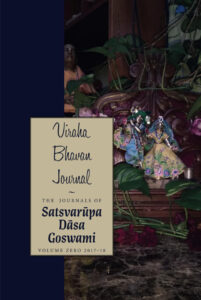
Viraha Bhavan Journal (2017–2018) was written by Satsvarūpa Mahārāja following a brief hiatus in writing activity, and was originally intended to be volume 1 in a series of published journals. However, following its completion and publication, Mahārāja again stopped writing books, subsequently focusing only on what became his current online journal, which began in August of 2018.
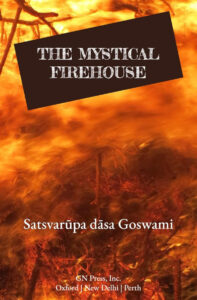
At first, I took it hard that I would have to live surrounded by the firemen, and without my own solitude. After all, for decades I had lived in my own house with my own books and my own friends. I was also now a crippled person who couldn’t walk, living among men who did active duties. But when Baladeva explained it to me, how it was not so bad living continually with other firemen and living in the firehouse with its limited facilities, I came to partially accept it and to accept the other men. I came to accept my new situation. I would live continually in the firehouse and mostly not go outside. I would not lead such a solitary life but associate with the other firemen.
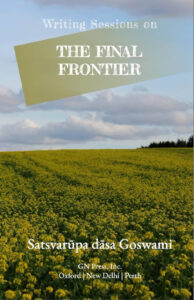
Let me write sweet prose.
Let me write not for my own benefit
but for the pleasure of Their Lordships.
Let me please Kṛṣṇa,
that’s my only wish.
May Kṛṣṇa be pleased with me,
that’s my only hope and desire.
May Kṛṣṇa give me His blessings:
Kṛṣṇa Kṛṣṇa Kṛṣṇa Kṛṣṇa Kṛṣṇa he
Rāma Rāghava Rāma Rāghava
Rāma Rāghava rakṣa mām.
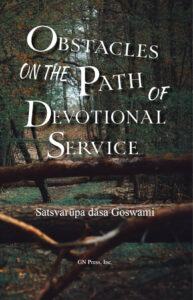
You mentioned that your pathway has become filled with stumbling blocks, but there are no stumbling blocks. I can kick out all those stumbling blocks immediately, provided you accept my guidance. With one stroke of my kick, I can kick out all stumbling blocks. —Letter by Śrīla Prabhupāda, December 9, 1972.
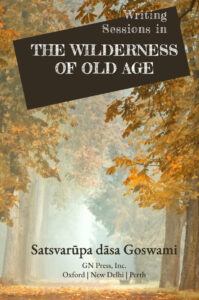
The Writing Sessions are my heart and soul. I’m trying my best to keep up with them. I am working with a few devotees, and they are far ahead of me. I wander in the wilderness of old age. I make my Writing Sessions as best I can. Every day I try to come up with a new subject. Today I am thinking of my parents. But I don’t think of them deeply. They are long gone from my life. Śrīla Prabhupāda wrote a poem when he was a sannyāsī, and he said now all my friends and relatives are gone. They are just a list of names now. I am like that too. I am a sannyāsī with a few friends. I love the books of Śrīla Prabhupāda. I try to keep up with them. I read as much as I can and then listen to his bhajanas.
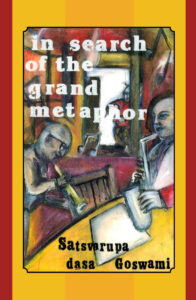
The metaphor is song. Explain it. Yes, particulars may not seem interesting or profound to readers who want structured books.
Wait a minute. Don’t pander to readers or concepts of Art. But Kṛṣṇa conscious criteria are important and must be followed. So, if your little splayed-out life-thoughts are all Kṛṣṇa conscious, then it’s no problem.
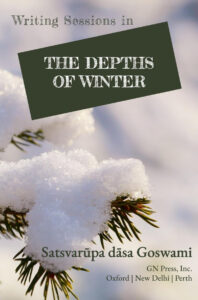
I am near the end of my days. But I do like the company of like-minded souls, especially those who are Kṛṣṇa conscious. Yes! I am prone to Kṛṣṇa consciousness. I have been a disciple of Bhaktivedanta Swami Prabhupāda for maybe almost sixty years. Sometimes I fail him. But I always bounce back and fall at his feet. It is a terrible thing that I sometimes do not have the highest love for him. It is a terrible thing. Actually, however, I never fall away from him. He always comes and catches me and brings me back to his loving arms.

This edition of Satsvarūpa dāsa Goswami’s 1996 timed book, Upstate: Room to Write, is published as part of a legacy project to restore Satsvarūpa Mahārāja’s writings to ‘in print’ status and make them globally available for current and future readers.
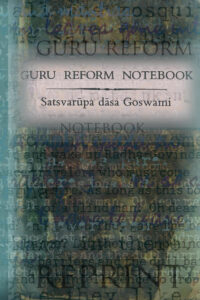
A factual record of the reform and change in ISKCON guru system of mid ’80s.

Readers will find, in the Appendix of this book, scans of a cover letter written by Satsvarūpa Mahārāja to the GN Press typist at the time, along with some of the original handwritten pages of June Bug. Together, these help to illustrate the process used by Mahārāja when writing his books during this period. These were timed books, in the sense that a distinct time period was allotted for the writing, during SDG’s travels as a visiting sannyāsī
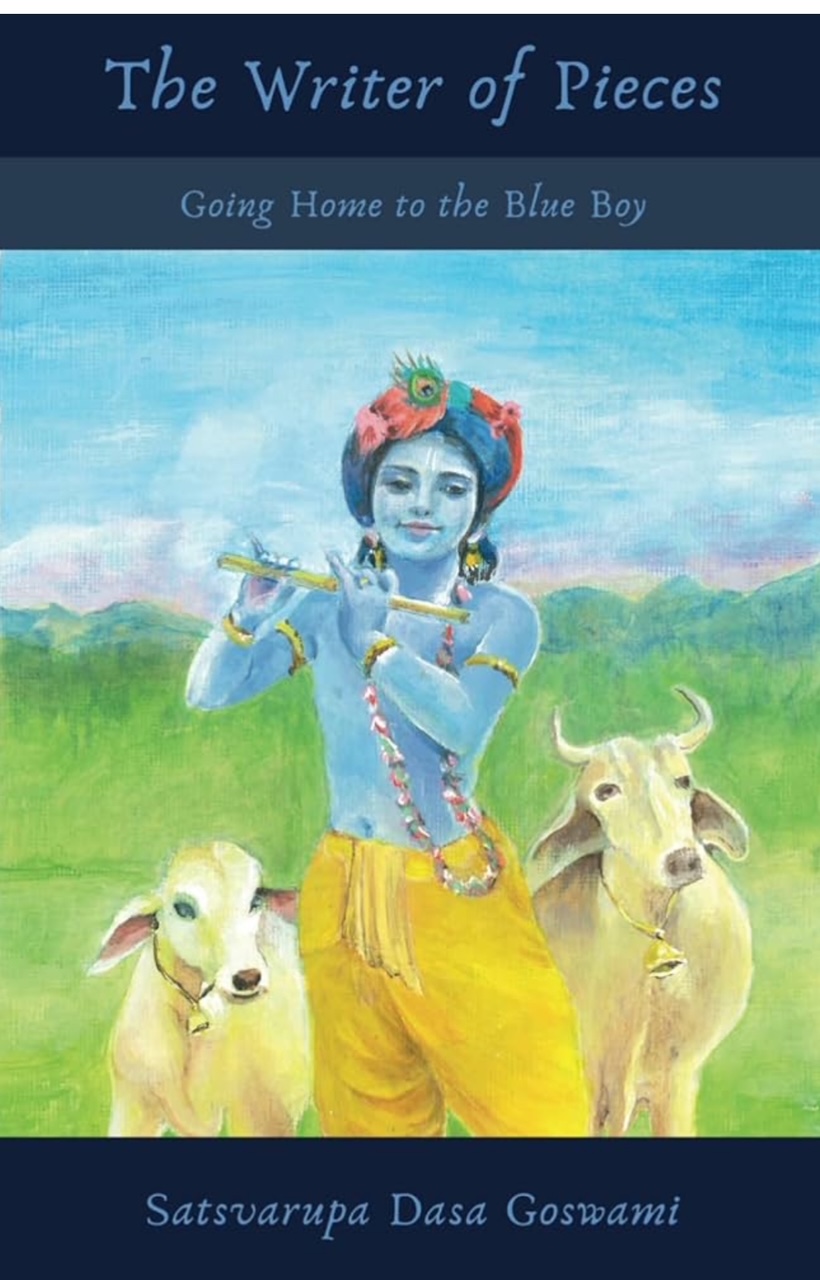
Don’t take my pieces away from me. I need them dearly. My pieces are my prayers to Kṛṣṇa. He wants me to have them, this is my way to love Him. Never take my pieces away.
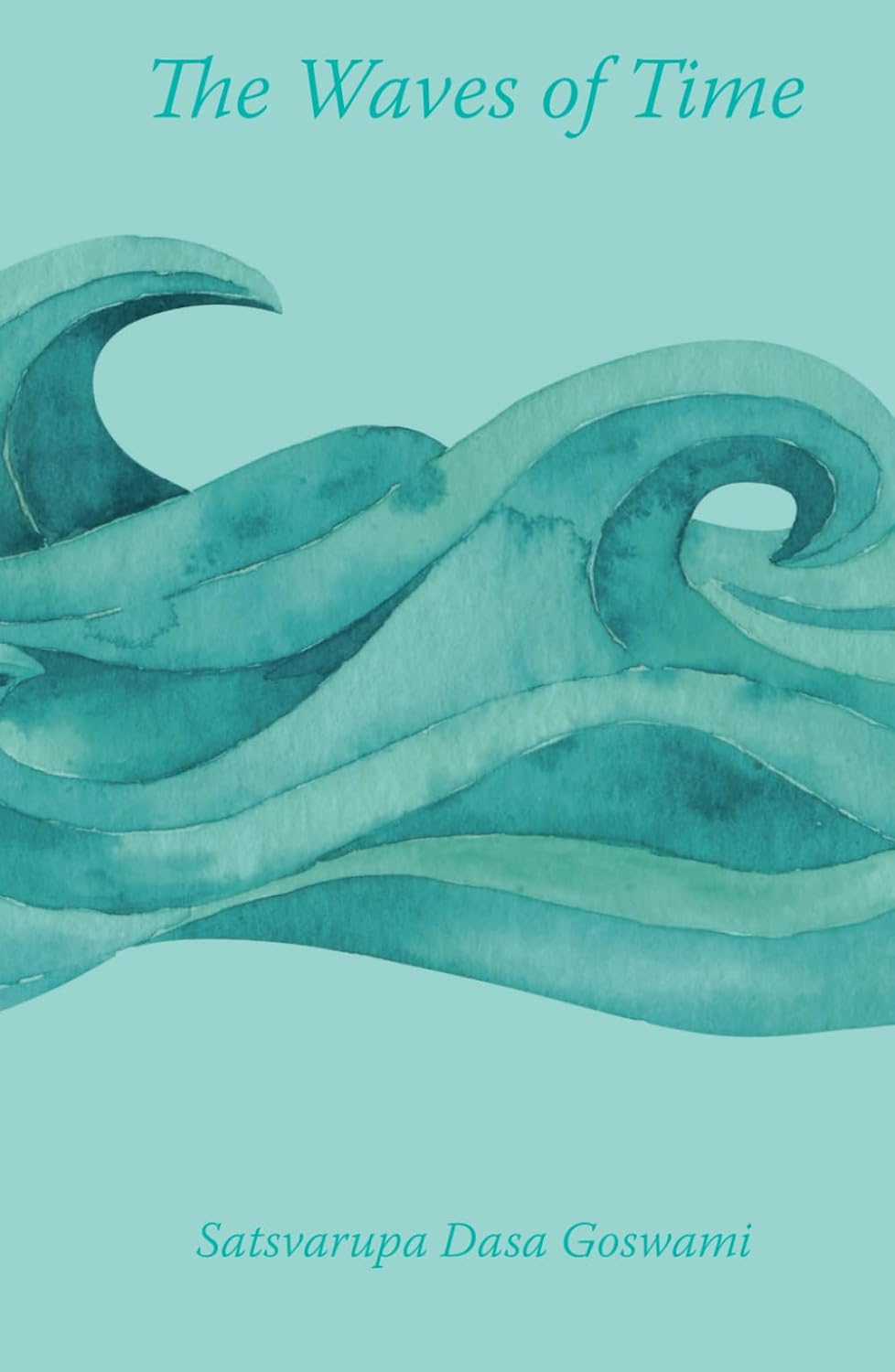
Many planks and sticks, unable to stay together, are carried away by the force of a river’s waves. Similarly, although we are intimately related with friends and family members, we are unable to stay together because of our varied past deeds and the waves of time.

To Śrīla Prabhupāda, who encouraged his devotees (including me) To write articles and books about Kṛṣṇa Consciousness.
I wrote him personally and asked if it was alright for his disciples to write books, Since he, our spiritual master, was already doing that. He wrote back and said that it was certainly alright For us to produce books.

I have a personal story to tell. It is a about a time (January–July 1974) I spent as a personal servant and secretary of my spiritual master, His Divine Grace A.C. Bhaktivedanta Swami Prabhupäda, founder-äcärya of the International Society for Krishna Consciousness. Although I have written extensively about Çréla Prabhupäda, I’ve hesitated to give this account, for fear it would expose me as a poor disciple. But now I’m going ahead, confident that the truth will purify both my readers and myself.

First published by The Gītā-nāgarī Press/GN Press in serialized form in the magazine Among Friends between 1996 and 2001, Best Use of a Bad Bargain is collected here for the first time in this new edition. This volume also contains essays written by Satsvarūpa dāsa Goswami for the occasional periodical, Hope This Meets You in Good Health, between 1994 and 2002, published by the ISKCON Health and Welfare Ministry.

This book has two purposes: to arouse our transcendental feelings of separation from a great personality, Śrīla Prabhupāda, and to encourage all sincere seekers of the Absolute Truth to go forward like an army under the banner of His Divine Grace A.C. Bhaktivedanta Swami Prabhupāda and the Kṛṣṇa consciousness movement.

A single volume collection of the Nimai novels.

Śrīla Prabhupāda was in the disciplic succession from the Brahmā-Mādhva-Gauḍīya sampradāya, the Vaiṣṇavas who advocate pure devotion to God and who understand Kṛṣṇa as the Supreme Personality of Godhead. He always described himself as simply a messenger who carried the paramparā teachings of his spiritual master and Lord Kṛṣṇa.

Dear Srila Prabhupada,
Please accept this or it’s worse than useless.
You have given me spiritual life
and so my time is yours.
You want me to be happy in Krishna consciousness
You want me to spread Krishna consciousness,

This collection of Satsvarūpa dāsa Goswami’s writings is comprised of essays that were originally published in Back to Godhead magazine between 1966 and 1978, and compiled in 1979 by Gita Nagari Press as the volume A Handbook for Kṛṣṇa Consciousness.

This second volume of Satsvarūpa dāsa Goswami’s Back to Godhead essays encompasses the last 11 years of his 20-year tenure as Editor-in-Chief of Back to Godhead magazine. The essays in this book consist mostly of SDG’s ‘Notes from the Editor’ column, which was typically featured towards the end of each issue starting in 1978 and running until Mahārāja retired from his duties as editor in 1989.

This collection of Satsvarupa dasa Goswami’s writings is comprised of essays that were originally published in Back to Godhead magazine between 1991 and 2002, picking up where Volume 2 leaves off. The volume is supplemented by essays about devotional service from issues of Satsvarupa dasa Goswami’s magazine, Among Friends, published in the 1990s.

“This is a different kind of book, written in my old age, observing Kṛṣṇa consciousness and assessing myself. I believe it fits under the category of ‘Literature in pursuance of the Vedic version.’ It is autobiography, from a Western-raised man, who has been transformed into a devotee of Kṛṣṇa by Śrīla Prabhupāda.”
 The Best I Could Do
The Best I Could DoI want to study this evolution of my art, my writing. I want to see what changed from the book In Search of the Grand Metaphor to the next book, The Last Days of the Year.
 a Hare Krishna Man
a Hare Krishna ManIt’s world enlightenment day
And devotees are giving out books
By milk of kindness, read one page
And your life can become perfect.
 Calling Out to Srila Prabhupada: Poems and Prayers
Calling Out to Srila Prabhupada: Poems and PrayersO Prabhupāda, whose purports are wonderfully clear, having been gathered from what was taught by the previous ācāryas and made all new; O Prabhupāda, who is always sober to expose the material illusion and blissful in knowledge of Kṛṣṇa, may we carefully read your Bhaktivedanta purports.

I use free-writing in my devotional service as part of my sādhana. It is a way for me to enter those realms of myself where only honesty matters; free-writing enables me to reach deeper levels of realization by my repeated attempt to “tell the truth quickly.” Free-writing takes me past polished prose. It takes me past literary effect. It takes me past the need to present something and allows me to just get down and say it. From the viewpoint of a writer, this dropping of all pretense is desirable.
 Geaglum Free Write
Geaglum Free WriteThis edition of Satsvarūpa dāsa Goswami’s 1996 timed book, Geaglum Free Write Diary, is published as part of a legacy project to restore Satsvarūpa Mahārāja’s writings to ‘in print’ status and make them globally available for current and future readers.